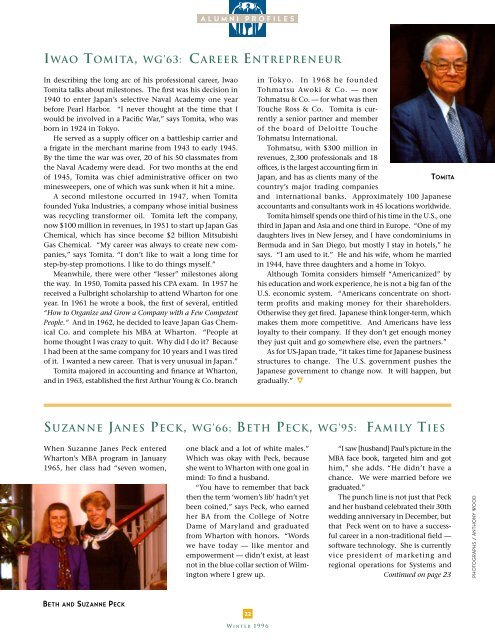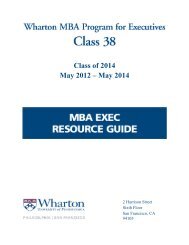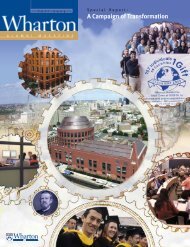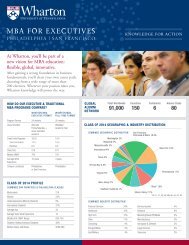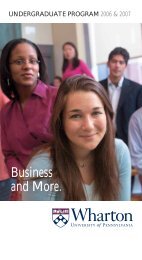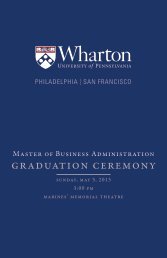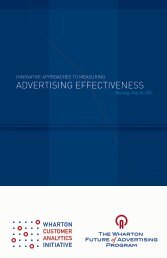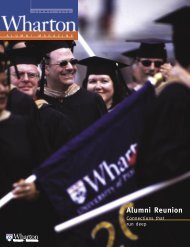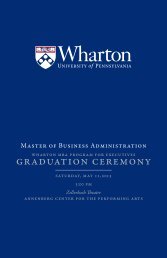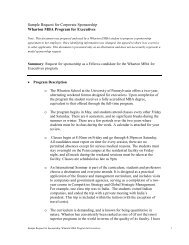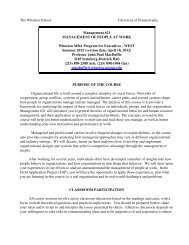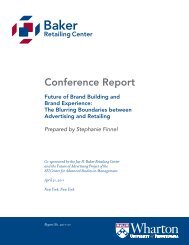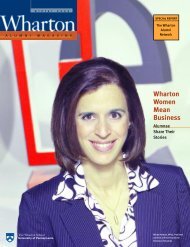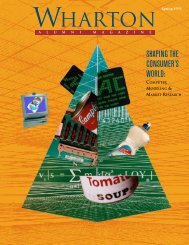wharton's prescription for health care - Wharton Magazine
wharton's prescription for health care - Wharton Magazine
wharton's prescription for health care - Wharton Magazine
Create successful ePaper yourself
Turn your PDF publications into a flip-book with our unique Google optimized e-Paper software.
ALUMNI PROFILESIWAO TOMITA, WG’63: CAREER ENTREPRENEURIn describing the long arc of his professional <strong>care</strong>er, IwaoTomita talks about milestones. The first was his decision in1940 to enter Japan’s selective Naval Academy one yearbe<strong>for</strong>e Pearl Harbor. “I never thought at the time that Iwould be involved in a Pacific War,” says Tomita, who wasborn in 1924 in Tokyo.He served as a supply officer on a battleship carrier anda frigate in the merchant marine from 1943 to early 1945.By the time the war was over, 20 of his 50 classmates fromthe Naval Academy were dead. For two months at the endof 1945, Tomita was chief administrative officer on twominesweepers, one of which was sunk when it hit a mine.A second milestone occurred in 1947, when Tomitafounded Yuka Industries, a company whose initial businesswas recycling trans<strong>for</strong>mer oil. Tomita left the company,now $100 million in revenues, in 1951 to start up Japan GasChemical, which has since become $2 billion MitsubishiGas Chemical. “My <strong>care</strong>er was always to create new companies,”says Tomita. “I don’t like to wait a long time <strong>for</strong>step-by-step promotions. I like to do things myself.”Meanwhile, there were other “lesser” milestones alongthe way. In 1950, Tomita passed his CPA exam. In 1957 hereceived a Fulbright scholarship to attend <strong>Wharton</strong> <strong>for</strong> oneyear. In 1961 he wrote a book, the first of several, entitled“How to Organize and Grow a Company with a Few CompetentPeople.” And in 1962, he decided to leave Japan Gas ChemicalCo. and complete his MBA at <strong>Wharton</strong>. “People athome thought I was crazy to quit. Why did I do it? BecauseI had been at the same company <strong>for</strong> 10 years and I was tiredof it. I wanted a new <strong>care</strong>er. That is very unusual in Japan.”Tomita majored in accounting and finance at <strong>Wharton</strong>,and in 1963, established the first Arthur Young & Co. branchin Tokyo. In 1968 he foundedTohmatsu Awoki & Co. — nowTohmatsu & Co. — <strong>for</strong> what was thenTouche Ross & Co. Tomita is currentlya senior partner and memberof the board of Deloitte ToucheTohmatsu International.Tohmatsu, with $300 million inrevenues, 2,300 professionals and 18offices, is the largest accounting firm inJapan, and has as clients many of theTOMITAcountry’s major trading companiesand international banks. Approximately 100 Japaneseaccountants and consultants work in 45 locations worldwide.Tomita himself spends one third of his time in the U.S., onethird in Japan and Asia and one third in Europe. “One of mydaughters lives in New Jersey, and I have condominiums inBermuda and in San Diego, but mostly I stay in hotels,” hesays. “I am used to it.” He and his wife, whom he marriedin 1944, have three daughters and a home in Tokyo.Although Tomita considers himself “Americanized” byhis education and work experience, he is not a big fan of theU.S. economic system. “Americans concentrate on shorttermprofits and making money <strong>for</strong> their shareholders.Otherwise they get fired. Japanese think longer-term, whichmakes them more competitive. And Americans have lessloyalty to their company. If they don’t get enough moneythey just quit and go somewhere else, even the partners.”As <strong>for</strong> US-Japan trade, “it takes time <strong>for</strong> Japanese businessstructures to change. The U.S. government pushes theJapanese government to change now. It will happen, butgradually.” ”SUZANNE JANES PECK, WG’66; BETH PECK, WG’95:FAMILY TIESWhen Suzanne Janes Peck entered<strong>Wharton</strong>’s MBA program in January1965, her class had “seven women,one black and a lot of white males.”Which was okay with Peck, becauseshe went to <strong>Wharton</strong> with one goal inmind: To find a husband.“You have to remember that backthen the term ‘women’s lib’ hadn’t yetbeen coined,” says Peck, who earnedher BA from the College of NotreDame of Maryland and graduatedfrom <strong>Wharton</strong> with honors. “Wordswe have today — like mentor andempowerment — didn’t exist, at leastnot in the blue collar section of Wilmingtonwhere I grew up.“I saw [husband] Paul’s picture in theMBA face book, targeted him and gothim,” she adds. “He didn’t have achance. We were married be<strong>for</strong>e wegraduated.”The punch line is not just that Peckand her husband celebrated their 30thwedding anniversary in December, butthat Peck went on to have a successful<strong>care</strong>er in a non-traditional field —software technology. She is currentlyvice president of marketing andregional operations <strong>for</strong> Systems andContinued on page 23PHOTOGRAPHS / ANTHONY WOODBETH AND SUZANNE PECK22W INTER 1996


